|
|
|
Sort Order |
|
|
|
Items / Page
|
|
|
|
|
|
|
| Srl | Item |
| 1 |
ID:
115067
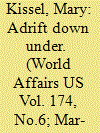

|
|
|
|
|
| Publication |
2012.
|
| Summary/Abstract |
John Winston Howard wasn't just voted out of office after a remarkably steady eleven-and-a-half-year stretch atop Australian politics in November 2007. He lost the prime minister's job to Kevin Rudd, a cheerless career bureaucrat with a skimpy parliamentary record, and lost his local seat to a toothy blond broadcaster with no political experience at all. Yet today the young and the old mob Howard when he wanders out in Sydney, wanting an autograph and a snap with the seventy-two-year-old. They realize that Australia's current leaders have veered the country away from the steady, prosperous path it was on for the past three decades, and in addition to feeling nostalgia for better days they want someone to steer their country back on track.
|
|
|
|
|
|
|
|
|
|
|
|
|
|
|
|
| 2 |
ID:
115071
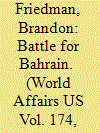

|
|
|
|
|
| Publication |
2012.
|
| Summary/Abstract |
After the popular uprisings that struck in Tunisia, Egypt, Libya, Bahrain, Yemen, and Syria, the surviving Middle East monarchies have come under heavy criticism in the West. Many believe it is only a matter of time until they are next. The conventional wisdom in the West is that this revolutionary change in the Middle East must be a positive thing. Popular demands for political freedom are viewed as part of the inevitable march of progress. Another implicit assumption in the West is that the monarchies, like the corrupt autocrats who have fallen, lack popular support.
|
|
|
|
|
|
|
|
|
|
|
|
|
|
|
|
| 3 |
ID:
115066
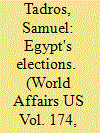

|
|
|
|
|
| Publication |
2012.
|
| Summary/Abstract |
When asked on January 30, 2011, about the Muslim Brotherhood's role in post-Arab Spring Egypt, the man seen by the media as a leading figure in the uprising, Mohamed ElBaradei, brushed aside Western fears: "They are not a majority of the Egyptian people. They will not be more than maybe twenty percent of the Egyptian people." For ElBaradei, Western fears of the Islamists dominating the Egyptian future were "a myth that was sold by the Mubarak regime." Nor was the former IAEA chief and Egyptian presidential hopeful alone in his insistence that the Muslim Brotherhood was only a harmless minority. President Obama agreed: "I think they're one faction in Egypt. They don't have majority support in Egypt."
|
|
|
|
|
|
|
|
|
|
|
|
|
|
|
|
| 4 |
ID:
115069
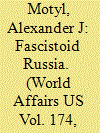

|
|
|
|
|
| Publication |
2012.
|
| Summary/Abstract |
The massive demonstrations that rocked Russia in the aftermath of the Duma elections of December 4, 2011, surprised everyone, including most Russians. But they shouldn't have. The conditions for such an upheaval have been ripening as a result of the growing power and decrepitude of Putinism. It is likely that popular mobilization will continue, and that the regime's days may be numbered.
|
|
|
|
|
|
|
|
|
|
|
|
|
|
|
|
| 5 |
ID:
115070
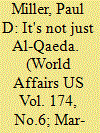

|
|
|
|
|
| Publication |
2012.
|
| Summary/Abstract |
Neither President Barack Obama nor the Republicans competing to run against him are eager to talk about the war in Afghanistan. The electorate certainly doesn't want to hear about it. Defense analysts are acting like it ended when Iraq did. Even more amazing is that most analysts and policymakers seem to believe that, one way or another, it doesn't actually matter very much that it didn't.
|
|
|
|
|
|
|
|
|
|
|
|
|
|
|
|
| 6 |
ID:
115064
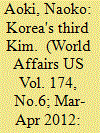

|
|
|
|
|
| Publication |
2012.
|
| Summary/Abstract |
The death of Kim Jong-il and subsequent dynastic transfer of power in North Korea caused a spasm of hope in the policy community that the secretive and totalitarian nation might embark on economic and political reforms. As the new leader, Kim Jong-un, was exposed to Western affluence while receiving his education in Switzerland-so the wishful thinking goes-surely he would realize the benefits of opening up his country. In fact, the young and inexperienced scion of the Kim dynasty derives his legitimacy solely from his family heritage. He has every reason to perpetuate the oppressive system built by his grandfather and buttressed by his father. In fact, how much Kim Jong-un's ideas and beliefs matter will remain questionable, at least over the short term. It is reasonable to assume that the untested leader will be guided by guardians or perhaps regents. This means that he may not be the one calling the shots, at least for the time being. The opaqueness of the power structure, meanwhile, has important implications for the outside world. The consolidation of power is likely to be still in progress, and it would take months-possibly even longer-for outside observers to learn how policies are determined. With Kim Jong-il, the world at least knew with whom it was dealing. Under Kim Jong-un, we may not even enjoy that advantage for some time to come.
|
|
|
|
|
|
|
|
|
|
|
|
|
|
|
|
| 7 |
ID:
115072
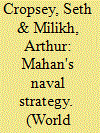

|
|
|
|
|
| Publication |
2012.
|
| Summary/Abstract |
The public debate over the federal budget often obscures the relation between our domestic and foreign interests. Such debates test democracy's prudence by forcing a choice between immediate and easily perceptible problems and the distant and often silent strategic interests underpinning policy. An enduring strategy that enables US political and military strength through commercial superiority hinges on naval power. We appear to have forgotten the vital and unique responsibilities assigned to a navy in a democratic society: how it preserves US commercial success and domestic material well-being and-most often ignored-how a navy establishes the conditions that make liberal commerce on the seas possible.
|
|
|
|
|
|
|
|
|
|
|
|
|
|
|
|
| 8 |
ID:
115063
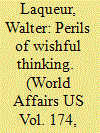

|
|
|
|
|
| Publication |
2012.
|
| Summary/Abstract |
Forecasting political events is always risky because chance plays such a decisive role in what becomes history. Given its inherent weaknesses, the breakdown of the Soviet Union, for instance, may have been inevitable. But if instead of Mikhail Gorbachev, appointed as General Secretary of the Communist Party as a sort of accident in 1985, a hard-liner had been chosen by the Politburo and if he and like-minded comrades had managed to hold onto power for another twenty years, what would we have witnessed? As the price of oil went up exponentially (from two dollars a barrel to as much as one hundred and fifty), the Soviet economy would have prospered, the empire would not have fallen apart, and the wisdom of the Communist Party and its leaders who brought about these gigantic achievements would have been praised.
|
|
|
|
|
|
|
|
|
|
|
|
|
|
|
|
| 9 |
ID:
115073
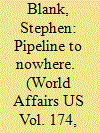

|
|
|
| 10 |
ID:
115065
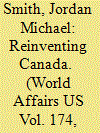

|
|
|
|
|
| Publication |
2012.
|
| Summary/Abstract |
The thin-haired, middle-aged man delivered a speech to the United Nations that undoubtedly left many in the international body fuming. He criticized Libya, Iran, and North Korea by name: "Just as fascism and communism were the great struggles of previous generations," he said, "terrorism is the great struggle of ours." He cited Winston Churchill and defended Israel. And he criticized the UN on its own turf. "The greatest enemies of the United Nations are those who quietly undermine its principles and, even worse, by those who sit idly, watching its slow decline."
|
|
|
|
|
|
|
|
|
|
|
|
|
|
|
|
| 11 |
ID:
115068
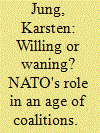

|
|
|
|
|
| Publication |
2012.
|
| Summary/Abstract |
Twenty years after the great debate over NATO's future at the end of the Cold War, we appear to have come full circle-"back to the future," in John Mearsheimer's words. Its instrumental role in pacifying the Balkans, its major commitment in Afghanistan, and its recent operation in Libya notwithstanding, the role and relevance of the alliance appear no more certain today than they were when the Berlin Wall came down in 1989. International relations specialists are certainly wondering. Rajan Menon has recently pondered "the end of alliances," and Stanley Sloan speculated about whether NATO might no longer be a "permanent alliance." In April 2011, James Joyner joyfully declared that the Libyan operation was helping "NATO get its groove back," but only four months later, toward the end of an exhausting half-year battle with Muammar el-Qaddafi's third-rate force, he was much less optimistic, penning a commentary for the National Interest titled "NATO fails in Libya."
|
|
|
|
|
|
|
|
|
|
|
|
|
|
|
|
|
|
|
|
|